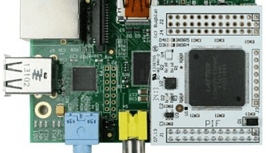Top Off Your Raspberry Pi with an FPGA
on

The PIF FPGA module from BugBlat is designed to mate with a Raspberry Pi. It is available in two versions, both built around a MachXO2 FPGA. The PIF-1200 version uses an XO2-1200 FPGA with 1,280 four-input lookup tables (LUTs), 64 kilobits of on-chip RAM, 64 kilobits of on-chip user flash memory and one PLL, while the PIF-7000 version uses an XO2-7000 with 6,864 four-input LUTs, 240 kilobits of on-chip RAM, 256 kilobits of on-chip user flash memory, two PLLs, a counter-timer, an SPI interface and dual I²C interfaces.
Adding an FPGA to a Raspberry Pi dramatically boosts performance for compute-intensive tasks such as algorithmic data processing. The FPGA on the PIF can be configured to implement one or more hardware acceleration functions, which can be controlled by the Raspberry Pi. The combination can also be used to emulate other logic devices, which can come in handy when you need the functionality of a legacy device that is no longer available.
The PIF platform provides a complete FPGA development target with no need for FPGA programming hardware, along with lots of on-chip LUTs, ample on-chip RAM, non-volatile on-chip flash memory for storing the configuration bit stream, up to 256 Kbits of user flash memory, and hard-coded I²C, SPI, PLL and timer/counter blocks.
BugBlat also offers a general purpose FPGA module for breadboard use, dubbed TIF, which features the MachXO2 FPGA with a companion 8051 microcontroller to handle interfacing and control tasks.


Discussion (0 comments)